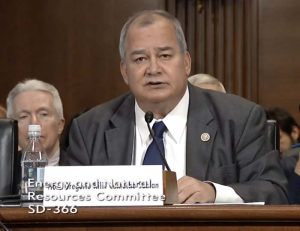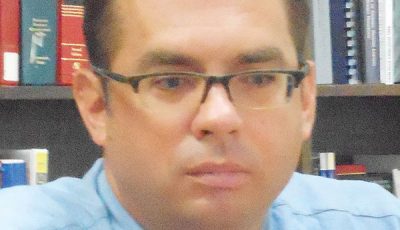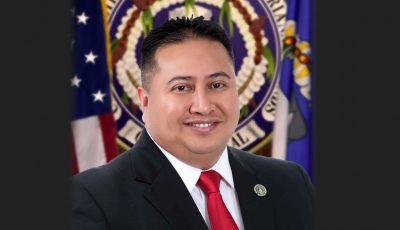Sablan, Murkowski bill lauded at Senate hearing

Delegate Gregorio Kilili C. Sablan )Ind-MP) speaks before the Senate Committee on Energy and Natural Resources hearing on the proposed the Northern Mariana Islands U.S. Workforce Act. (Contributed Photo)
WASHINGTON, D.C.—In closing Wednesday’s Senate committee hearing on the Northern Mariana Islands U.S. Workforce Act, committee chair Sen. Lisa Murkowski (R-AK) agreed with Delegate Gregorio Kilili C. Sablan’s (Ind-MP) statement that the legislation changes the dynamic on labor policy on the islands.
“This bill would spur us into getting a Northern Marianas economy that would have U.S. workers as the main workforce,” Sablan told the committee. “Third country nationals would come in to fill the gaps, where there are really no U.S. workers.”
Murkowski and Sablan both introduced the U.S. Workforce Act on Jan. 19 after months of work by a bipartisan group from the House and the Senate. The bill adds 10 years to the current labor transition period and makes 8,000 extra CW permits available for next year.
Murkowski, as chair of the Senate Committee on Energy and Natural Resources, led the working group and quickly decided to hold a hearing on the bill.
“We wanted to be sure the economy would have workers. Our bill does that,” Sablan said. “We wanted to be sure that more Americans would be getting jobs. Our bill does that, too.”
Murkowski described their bill as “a good product.”
“While I am willing to support extending the transition period, I remain committed to the intent of the transition, which is to increase the number of U.S. workers in the CNMI economy while reducing the dependence on foreign labor,” she said.
Committee ranking member Maria Cantwell (D-WA) thanked Sablan “for his leadership in working with us these past several months in a bipartisan way with the staff of the committee and the Judiciary Committee to identify the path forward for a 10-year transition from the CW program.
“This bill, in my view, effectively promotes continued economic growth for the Marianas, but also imposes additional safeguards to make sure that protections are in place for workers,” Cantwell added.
Also attending the hearing were Sens. Martin Heinrich (D-NM) and Mazie Hirono (D-HI), who entered the House of Representatives with Sablan in 2009. Heinrich and Sablan served together on the House Committee on Natural Resources.
“You’ve been incredibly dogged and determined in moving legislation for CNMI over the years through some pretty hard-to-navigate Congresses, and I think you deserve credit for that,” Heinrich told Sablan.
Democratic Sens. Catherine Cortez-Masto of Nevada and Tina Smith of Minnesota also questioned witnesses on labor conditions in the Marianas.
Sablan told the panel that the U.S. Workforce Act is premised on two policy goals that should find broad agreement in Congress: 1) that the Marianas economy should have sufficient labor to continue growth; and 2) that the Marianas labor force should increasingly be composed of U.S. workers.
The Workforce Act extends the current transition period for 10 years, to 2029, and resets the cap on Commonwealth-Only Transitional Worker permits to 13,000. The bill also includes new protections for U.S. workers to ensure they are not at a competitive disadvantage with foreign workers and adds safeguards for foreign workers against exploitative or predatory labor practices.
Speaking for the Trump administration, Interior’s Assistant Secretary for Insular Affairs Douglas Domenech said, “The administration would be open to supporting legislation that facilitates the hiring of Americans and reduces [the] CNMI’s overall reliance on foreign labor by requiring a responsible, explicit wind-down of CW-1 visas to zero.”
Sablan submitted for the record statements of support for the U.S. Workforce Act that the congressional office has received from Marianas constituents, including several resolutions passed by the Marianas Legislature, and letters from Senate President Arnold Palacios, Saipan Chamber of Commerce President Velma Palacios, Northern Marianas Trades Institute chief executive officer Agnes McPhetres, Triple J Saipan chairman and chief executive officer Robert H. Jones, IT&E chief executive officer James Ohlerking, Hyatt Regency Saipan general manager Nick Nishikawa, Tano Group principal Robert J. Bracken, small business owner Jill Derickson, and military retiree Joseph Butters.
“I thank everyone in the Marianas government and private sector, as well as ordinary citizens, who showed their support for this bill,” Sablan said. “And it’s not too late for others who would still like to express their support for this critical legislation,” he added, noting that a hearing in the House Committee on Natural Resources is also expected.
Marianas constituents who wish to submit letters of support should reference the NMI U.S. Workforce Act in their statements (and include both the House and Senate versions, which are identical, H.R. 4869 and S. 2325) and address their letters to:
Chairman Lisa Murkowski and Ranking Member Maria Cantwell
Senate Committee on Energy and Natural Resources
304 Dirksen Senate Building
Washington, DC 20510
Chairman Rob Bishop and Ranking Member Raul Grijalva
House Committee on Natural Resources
1324 Longworth House Office Building
Washington, DC 20515
Letters should be copied to Sablan and may be emailed to kilili@sablan.house.gov or delivered to any of the district offices on Saipan, Tinian, or Rota. Constituents are also encouraged to submit letters to the editor to local newspapers, and post their support on social media, #KililiWorkforceAct.
Video of the full Senate hearing is available on Sablan’s Facebook page, https://www.facebook.com/congressmansablan/. Clips from the hearing and more information about the U.S. Workforce Act can be found at https://sablan.house.gov. (PR)


























